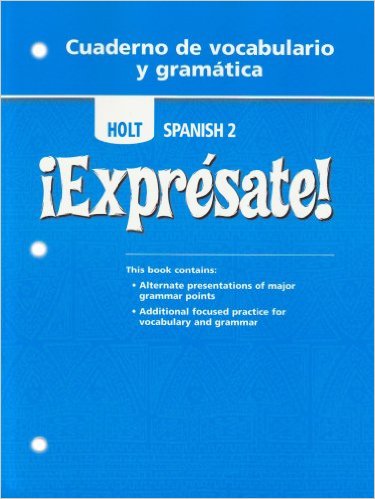
All Solutions
Page 7: Vocabulario
In the first sentence, which says that this evening they will celebrate the grandma’s birthday, the correct option is “vamos” because the periphrasis “ir + a + infinitive” is used to talk about plans. Therefore, the correct option is “vamos”.
2) está
3) decorando
4) la cena
5) ayudarla
6) limpiar
The words in the parentheses are *vamos* which means *we go*, and *ayudamos* which means *we help*.
Since the question is about where they plan to go, the most appropriate word to form an answer is **vamos**. Let’s see some examples for the answer:
|Spanish |English |
|–|–|
|Mis amigos y yo vamos a un parque de diversiones. | My friends and I go to an amusement park. |
|Mis amigos y yo vamos a una cafetería. | My friends and I go to a coffee shop.|
The words in the parentheses are *prefiero* which means *I prefer*, and *necesito* which means *I need*.
In this case the question is about what do yo prefer to do, so the most appropriate word to form an answer is **prefiero**. Let’s see the two possible answers:
|Spanish |English |
|–|–|
|Yo prefiero ir al centro. |I prefer to go downtown. |
|Yo prefiero visitar un museo. |I prefer to visit a museum. |
The words in the parentheses are *me levanto* which means *I get up*, and *me encanta* which means *I like*.
Since the question is about what you like to watch on television, the most appropriate words to form an answer is **me encanta**. Let’s see some examples for the answer:
|Spanish |English |
|–|–|
|Me encanta ver películas de terror. | I like to watch horror movies.|
|Me encanta ver series de comedia. |I like to watch comedy series. |
The words in the parentheses are *tenemos ganas* which means *we want*, and *no estamos* which means *we are not*.
In this case the question is about where you plan to go, so the most appropriate words to form an answer is **tenemos ganas** to describe where you want to go. Let’s see some examples for the answer:
|Spanish |English |
|–|–|
| Mi familia y yo tenemos ganas de ir a la playa. |My family and I want to go to the beach. |
|Mi familia y yo tenemos ganas de ir al club campestre. | My family and I want to go to the country club. |
The words in the parentheses are *no te olvides* which means *don’t forget*, and *no sé* which means *I don’t know*.
In this case the question is if you have something to do this afternoon, so the most appropriate words to form an answer is **no sé**. Let’s see an example for the answer:
|Spanish |English |
|–|–|
|No sé qué hacer esta tarde, tengo que estudiar. | I don’t know what to do this afternoon, I have to study. |
The given words are *tener* which means *to have*, and *limpiar el baño* which means *to clean the bathroom*.
There are two possible answers depending on whether Carmen’s mother is going to clean the bathroom with her or not, following the example. Let’s see them below:
| Spanish| English|
|–|–|
|Tenemos que limpiar el baño. |We have to clean the bathroom. |
| Tienes que limpiar el baño.|You have to clean the bathroom. |
The given words are *sí* which means *yes*, and *sacar la basura* which means *to take out the trash*.
Since Carmen asks directly if she can help in this case, let’s assume that Carmen has to take out the trash by herself. Let’s see some answers:
|Spanish |English |
|–|–|
| Sí. Saca la basura, por favor. | Yes. Take out the trash, please.|
| Sí. Puedes sacar la basura. | Yes. You can take out the trash.|
The given words are *deber* which means *should*, *poner la mesa* which means *to set the table*, and *lavar los platos* which means *to wash the dishes*.
Since Carmen is asking what needs to be done in the kitchen there are two possible answers depending on whether Carmen’s mother is going to help her or not. Let’s see them below:
|Spanish |English |
|–|–|
|Debes poner la mesa y lavar los platos. |You should set the table and wash the dishes. |
|Debemos poner la mesa y lavar los platos |We should set the table and wash the dishes. |
The given words are *deber* which means *should*, *poner* which means *to put*, *postre* which means *dessert*, and *refrigerador* which means *refrigerator*.
In this case Carmen is asking directly what else she should do. Let’s see an answer:
| Spanish|English |
|–|–|
| Debes poner el postre en el refrigerador. |You should put the dessert in the refrigerator. |
Among the words given we find *pasar* and *aspiradora*, which in the context of the question we must see them as a whole, referring to *pasar la aspiradora* which means *to vacuum*. There is also *sala* which means *living room*.
Once again, Carmen is asking what else she can do on her own. Let’s see an answer:
| Spanish|English |
|–|–|
|Pasa la aspiradora en la sala. | Vacuum the living room.|
The given words are *sí* which means *yes*, *no olvidarse* which means *to not forget*, *cortar* which means *to cut*, and *césped* which means *grass*.
In this case, Carmen asks her mother if, after doing her chores, there is something else she can do. His mother’s answer would be the following:
| Spanish|English |
|–|–|
|Sí. No olvides cortar el césped. | Yes. Don’t forget to cut the grass. |

